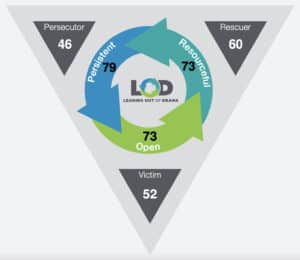
Drama Resilience: How The Best Leaders Handle Conflict
Share viaWe believe that conflict is neither good nor bad. It is simply the gap between what we want and what we are experiencing at any moment in time. The best leaders know how to use conflict productively instead of getting sucked into drama.
Conflict, Drama, and Compassion
Conflict generates significant energy. How we spend that energy is the difference between draining, destructive conflict and generative, productive conflict.
Drama is destructive conflict.
Drama is the misuse of conflict energy to struggle against ourselves or each other, with or without awareness, to feel justiified about our negative behavior.
Measuring Drama Resilience
In 2012 we developed and validated an assessment to measure a person, team, or organization’s tendencies to respond to conflict with drama. It was based on Dr. Stephen Karpman’s Drama Triangle and was the first instrument to quantify the behaviors associated with each of the three Drama Roles; Persecutor, Victim, and Rescuer.
At the same time, we evolved Karpman’s Compassion Triangle into our own Compassion Cycle, which describes three fundamental skills that are the antidotes to drama; Openness, Resourcefulness, and Persistence. Our framework shows how each of these skills works together to combat drama and turn conflict into creative potential.
In the past decade, over 96% of people who learn and apply our framework for Compassionate Accountability® rate it as superior to any other model of conflict communication they’ve encountered.
Watch a video about the evolution of our Compassionate Accountability framework.
Every consulting, coaching, and training program that we deliver is grounded in our assessment, which measures a person’s Drama Risks and Compassion Skills. By comparing the two, we can get a snapshot of a person’s Drama Resilience – their capacity to respond to conflict with Compassionate Accountability instead of drama.
Why Does Drama Resilience Matter in Leadership?
Drama Resilience is a critical factor in leadership at all levels, because;
- Drama moves energy away from results and wellness (thanks to Cy Wakeman, my favorite “anti-drama queen”, for this fitting description)
- Conflict is everywhere, so leaders must learn how to use it productively.
- Compassion is a fundamental ingredient for psychological safety.
- Compassion improves teamwork, morale, productivity, and engagement.
- People skills are only becoming more critical as A.I. grows.
Over the last decade, we have accumulated a considerable amount of data on Drama Resilience among leaders. Our global database includes nearly 20,000 assessments, mostly from leaders who have been involved in various professional development initiatives using our tools. Our network of over 100 certified trainers, coaches, and consultants, working across 13 countries in six languages have contributed to this data since they all use the same assessment as the foundation of their work.
Global Data on Drama Resilience Among Leaders
Here’s our global data for 2024.

Leader Drama
Let’s start with drama. Scores for each of the three Drama Roles range from 0 (none of the time) to 100 (all of the time). We can see that among leaders, the highest risk for drama is Rescuing. Rescuing is when people insert their solutions and advice without other’s consent. Rescuing, while coming from a place of good intentions, undermines initiative, capability, and self-confidence.
Much of the problem can be attributed to the Peter Princple. Replacing Rescuing with Resourcefulness is one of the top growth areas we work with among leaders.
How to promote for resourcefulness and avoid the Peter Principle.
Leader Compassion
With Compassion Skills, higher numbers represent more compassion competence.
Persistence is the highest Compassion Skill among leaders. This is not a surprise, since most organizations value perseverance, loyalty, and commitment. The biggest problems occur when Openness is weak or not balanced with the other two Compassion Skills. Openness creates psychological safety, invites transparency, and allows the real issues to surface. When leaders learn to be more open, their effectiveness increases considerably.
All three skills are critical for flourishing cultures. Openness supports safety, Resourcefulness supports curiosity, and Persistence supports consistency.
Interpreting Drama Resilience
Drama Resilience is calculated by comparing Compassion Strengths to Drama Risks. A positive number means compassion is prevailing. A negative number means drama is prevailing. Among leaders globally, the Drama Resilience Ratio is 1.42, meaning that compassion is 1.42 times more prevalent than drama in their lives. This is good news!
Drama Resilience Ratios between 1 – 1.5 usually indicate environments that are susceptible to drama and can easily deteriorate under pressure. Ratios above 1.5 can withstand more disruption without resorting to drama. When ratios exceed 2.0, we begin to see flourishing in relationships and teams.
What Does It Take?
Improving drama resilience requires gaining proficiency in recognizing drama in oneself and others, developing one’s Compassion Skills, and redirecting conflict energy away from drama, towards Compassionate Accountability. Our signature method for doing this is called ORPO.
Here’s how one leader achieved a breakthrough by applying our ORPO framework that she learned in our The Compassion Mindset® course.
Conflict is a natural, inevitable, and frequent reality in leadership. Leaders who develop their Drama Resilience can leverage the natural potential in conflict to produce positive results and become agents of transformation.
Copyright Next Element Consulting, LLC 2024
Is Drama Draining Your Energy?
Book Your Next Keynote Speaker

Author and Co-founder of Next Element, Dr. Nate Regier is available to speak at your upcoming event.
Submit a Speaker RequestPodcast: Listen to Nate "On Compassion"
 Listen to the Podcast
Listen to the Podcast



0 Comments
Add comment